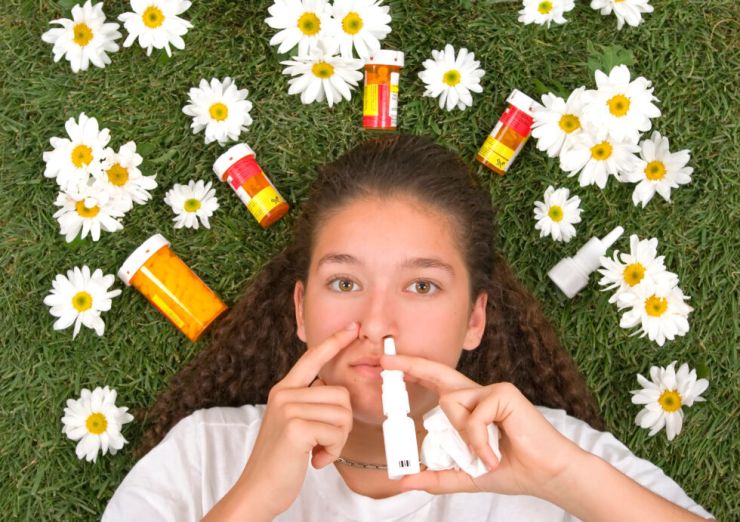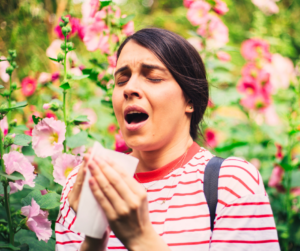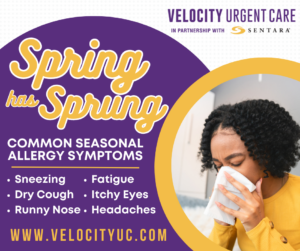Velocity Urgent Care is becoming Sentara Urgent Care
As part of the Sentara family of care, our name will be changing to Sentara Urgent Care on February 3, 2025.
Velocity Urgent Care is becoming Sentara Urgent Care
As part of the Sentara family of care, our name will be changing to Sentara Urgent Care on February 3, 2025.

As trees blossom and flowers bloom, people start to notice that their eyes are itchy, and their nose is running. The symptoms associated with springtime allergies can make going about your daily life miserable. Fortunately, there are some ways to battle your seasonal allergies.
Those who have suffered from seasonal allergies for years likely already know their “triggers.” Also known as hay fever, seasonal allergies are the body’s reaction to harmless substances which it mistakes for dangerous invaders. In the spring, pollen from blooming trees, flowers, and plants is the most likely culprit.
Approximately 30% of adults and 40% of children in the United States suffer from seasonal allergies. Allergy season is nearly in full swing. Although that means there are plenty of beautiful plants and trees blooming, it also means that the seasonal allergies of tens of thousands of people will soon be flaring up.

For most people, the symptoms of seasonal allergies resemble those of a cold. Most commonly, people experience a runny nose, itchy, watery eyes, sneezing, and possibly a sore throat. In some cases, sinus infections and headaches can occur because of the excess drainage associated with seasonal allergies.
Although there isn’t a cure for seasonal allergies, there are several ways to treat them. Taking these steps can help you feel less miserable and avoid walking around with watery eyes and a runny nose all spring.
Although it’s impossible to completely avoid allergy triggers like pollen at this time of year, limiting your exposure to them by staying indoors is a good first step. If you do go outside for some fresh air, taking some precautions at home can decrease the amount of pollen you bring back. After coming home, be sure to take off your clothes and throw them in a closed-lid hamper. You can also purchase a HEPA air filter to eliminate airborne allergens in your home.
Another way to try and limit seasonal allergy symptoms is a sinus rinse. Pollen is a very sticky material that tends to get trapped in your nasal passages. Rinsing with a saline solution helps flush it out and gets rid of the built-up mucus. Squeeze bottles with a premade solution are readily available at drugstores. Or you could invest in a neti-pot, a small device specifically designed for nasal rinsing.
For those with persistent seasonal allergy symptoms, over-the-counter allergy medications may help. Oral antihistamines (like Zyrtec, Allegra, and Claritin) help control a wide variety of allergy symptoms. For those with allergies that particularly affect their nose, decongestant medications (like Sudafed) can decrease your stuffiness and help mucus drain easier.

If you are a seasonal allergy sufferer in Virginia, Velocity Urgent Care has your back. Our clinics across the state are ready to address your healthcare needs.
Our team of friendly, board-certified providers will ensure that your allergies are just that, allergies, and not something more concerning. You will receive quick, affordable care to address your allergy symptoms and start feeling better. After a medical exam, our providers can prescribe antihistamine medications and nasal sprays to eliminate your itchy eyes and runny nose. If you’re dealing with more severe symptoms, they can also refer you to an allergy specialist. Feel free to walk in during our convenient hours or check in online and skip the waiting room. Whether you have seasonal allergy symptoms, an earache, a stomachache, a sprained ankle, or are just feeling under the weather, Velocity Urgent Care is the place to go for fast, safe, and effective treatment.
We are an in-network provider for most major insurance plans, meaning you can be seen for the cost of your co-pay and deductible. All our locations also accept Medicare, Medicaid, and Tricare. Veterans Administration beneficiaries are also welcome!